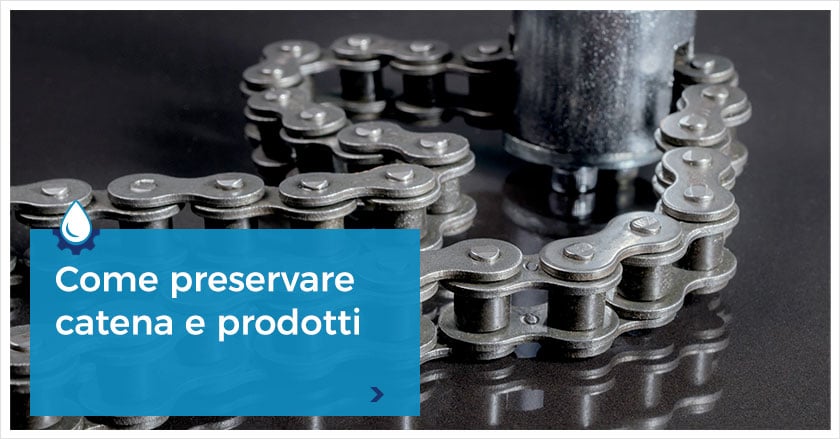
How to preserve chains and products
The longevity of chains is an increasingly important issue in the industrial field, given the widespread use of conveyor belts that can be made of different materials, from steel to plastic.
At the same time, containers and products that occupy the conveyor belts can also be made of glass, plastic, metal and so on. This is why it is important that industrial chain lubrication also guarantees compatibility with all such elements, so that production is not affected.
It is thus necessary to choose the most suitable lubricant for your field of application.
Industrial chain lubrication: the advantages
As we have seen, proper lubrication of industrial chains is necessary for the proper functioning of the entire transport and production mechanism. But what are the real advantages?
- The main benefit is certainly that using the proper chain lubricant allows you to limit wear, whilst preserving the integrity of the chain itself
- Another very important aspect is the reduction of noise in the roller of the conveyor belt, which can thus slide smoothly on the guides and gently impact on the gear teeth
- Last but not least, it prevents the entry of abrasive materials into the joints or on the contrary, the contamination of the product with materials or with the same lubricants for industrial chains
Some of the most common compatibility problems between lubricants and materials include:
- Compatibility of plastic materials - chemical sensibility to lubricants
- Lubricants for plastic - compatibility with silicon greases
- O-rings and seals in rubber - compatibility with lubricating fluids
Industrial chain lubrication: automotive industry
The example that we are going to analyse, which actually happened in the plant of a well-known automotive group regarding the car painting phase, concerns precisely the contamination of the product, which is not so common.
The use of lubricating solutions not compatible with the cataphoresis treatment together with the insufficient adhesiveness of the lubrication oil of the transport chains has caused an alteration of the deposition process and electrochemical adhesion of the paint primer on the car bodies. The result of this process, not immediately identified in the production chain, led to the appearance on the bodywork of "bridging" (better defined as areas of discontinuity of the coating) at the end of the paint deposition process.
This is a clear sign that the viscosity and adhesiveness of the lubricant, together with the compatibility with the production process, play a key role in the field of lubrication of industrial chains!
Such damage is certainly not insignificant if we consider how many pieces are produced in series today thanks to modern technologies but which was subsequently solved thanks to the development of a solution, being:
- Balanced in terms of viscosity and adhesiveness to the friction areas
- Compatible with the painting process
Industrial chain lubrication: the right choice
There are many types of lubricants for industrial chains on the market, each of which has specific characteristics to meet just as many specific needs.
Choosing the chain lubricant that best suits your needs is not easy and requires taking into account several aspects, such as:
- Conveyor belt materials
- Materials of the products transported
- Operation of the transport system
- Density and adhesiveness of the lubricant to the friction areas
Tell us your needs and request a test sample of the lubricant suitable for you!



